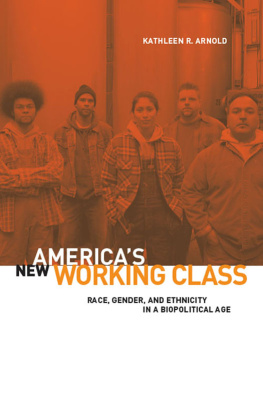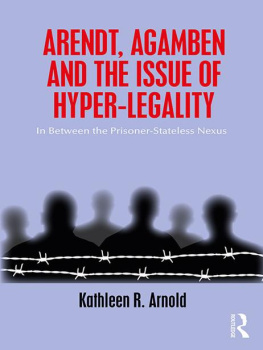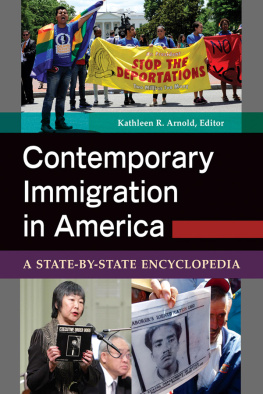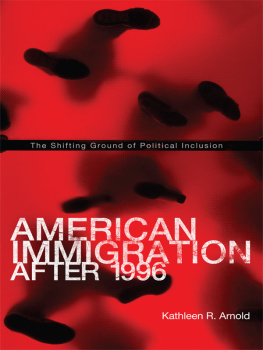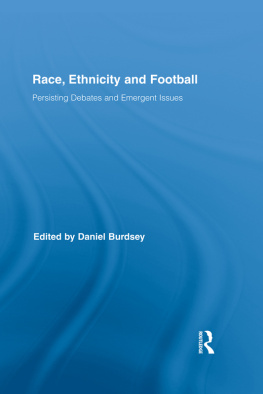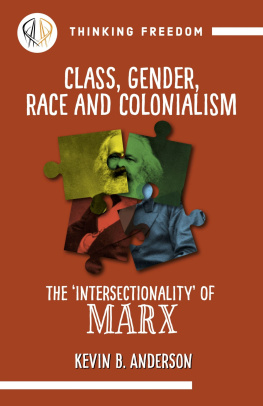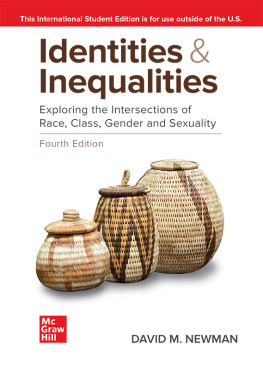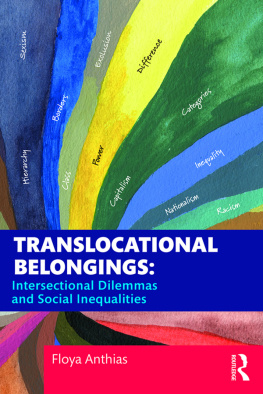Americas New Working Class
Library of Congress
Cataloging-in Publication Data
Arnold, Kathleen R., 1966
Americas new working class : race, gender, and ethnicity in a biopolitical age / Kathleen R. Arnold.
p. cm.
Includes bibliographical references and index.
ISBN 978-0-271-03276-4 (cloth : alk. paper)
1. Working classUnited States.
2. Unskilled laborUnited States.
3. Working poorUnited States.
4. Political cultureUnited States.
5. Social conflictUnited States.
6. GlobalizationEconomic aspectsUnited States.
I. Title.
II. Title: Race, gender, and ethnicity in a biopolitical age. HD8072.5.A757 2008
305.5620973dc22
2007019591
Copyright 2008
The Pennsylvania State University
All rights reserved
Printed in the United States of America
Published by
The Pennsylvania State University Press,
University Park, PA 16802-1003
The Pennsylvania State University Press
is a member of the
Association of American University Presses.
It is the policy of The Pennsylvania State University Press to use acid-free paper. This book is printed on Natures Natural, containing 50% post-consumer waste, and meets the minimum requirements of American National Standard for Information SciencesPermanence of Paper for Printed Library Material, ANSI Z39.481992.
CONTENTS
For Hannah With All My Love
First, I would like to acknowledge Theory and Event for allowing me to reprint a version of Asceticism in Contemporary Political Theory: Marx, Weber, Nietzsche, and Beyond, Theory and Event 8, no. 2 (2005); and Polity for allowing me to reprint a version of Domestic War: Lockes Concept of Prerogative and Implications for U.S. Wars Today, Polity, January 2007.
It is difficult to thank everyone who has spoken to me about this bookfrom interlocutors at conferences to colleagues at my former and current universities, not to mention students who have challenged my ideas or passed on interesting articles to meso please let this serve as a general acknowledgment of the wealth of opportunities I have had to have my work discussed and examined thoughtfully. In particular, I would like to thank Karen Zivi, with whom I exchanged ideas at the beginning of this project, as well as Thad Williamson, Christopher Sturr, Tommie Shelby, Joshua Dienstag, Karuna Mantena, and Verity Smithall good friends from the Social Studies Program (or thereabouts) at Harvard. Verity Smith was an especially important reader, critic, and friend, and I thank her for her comments and time. Older friends such as Nick Xenos, Kimberly Sims, Kevin Cameron, Antonio Vazquez y Arroyo, and Eugene Sheppard were also great sounding boards for my initial ideas. In particular, Nick encouraged me a great deal in working on the chapters on asceticism and prerogative power.
More recently, I would like to thank Steven Amberg and Daniel Engster at the University of Texas, San Anonio, for extensive comments and conversations about these ideas. They not only helped me with my work but facilitated my integration into academic life in San Antonio. I am also grateful to audiences, discussants, and chairs at the American Political Theory conferences and the Western Political Science Association and American Political Science Association meetings.
Sandy Thatcher has been a wonderful editor with whom to workhis comments and suggestions were incredibly useful, and I thank him for his enthusiasm for this project. My anonymous reviewers were also constructive in the best possible ways. Finally, I would like to acknowledge the support of my parents and close friends. My sister, Michelle, has also been an incredible source of strength for me over the yearsboth as a fellow academic and as a friend. She has been an invaluable listener, regardless of the subject, and an irreplaceable part of my life. I am very luicky to have her as a sister. Last, Marcus Pepper has introduced me to a whole new life and perspective in Texasthe viewpoint of a small farmer, a contractor who works with immigrants, and someone who grew up on the border. I dedicate this book to our daughter Hannah.
In this book, explore the relationship of the state to global capital by looking at the new working class. In the early twenty-first century, the question of the survival of the nation-state has been central. In the literature on the globalization of the economy, it is often argued that the nation-states authority is inevitably (and rightly) being challenged and undermined by multinational corporations and some transnational bodies. and ostensibly undermining national sovereignty and border controls. According to this story, the globalization of the economy will follow its inner logic, leaving a minimal and substantively empty role for the nation-state (e.g., administering voting, organizing the military and police, and addressing the few needs that the market cannot satisfy). Capital and people will flow across borders freely, naturally distributing wealth and labor where needed. The disappearance of the boundaries and strictures of the nation-state, not to mention ethnic nationalism, is not only highly desirable but also inevitable. Put more simply, deregulation is said to equal freedom, and the traditional role of the nation-state, with its accompanying problems of ethnic nationalism, is a hindrance to this freedom.
Critics of the nation-state, who were most prominent in the 1990s, also believe that the nation-state is an obstacle to freedom, albeit democratic rather than economic freedom. Their texts, which focus on the illiberal aspects of the power of the nation-state and nationalismaspects that not only curtail freedom but also uproot people more permanently than ever beforedo not see the nation-state or nationalism disappearing any time soon. These criticisms thus seem increasingly irrelevant as we enter a more global world;
In this book, I propose that the nation-states power is indeed changing and that the nation-state (particularly the United States) is both fighting its own obsolescence and promoting economic globalization. Thus, while neoliberals would have us believe that economic and political deregulation is the most advantageous route for us all, allowing greater freedoms, they also paradoxically demand total faith in the state and its decision making in the war against terrorism (most recently in the Iraq bombardment and war of 2003), signaling an absence of freedom. This paradox suggests strongly that prerogative powerstate action outside of the law, that which marks the state as a state
It is widely recognized that blue-collar work has changed in the United States, along with the workforce performing these jobs. As a result of Most of the individuals performing this work are not unionized and are subject to low-wage strategies that include temporary or contract jobs, no benefits, and irregular hours. In fact, the conditions that Marx described in the mid 1800sdisenfranchisement of workers, inability to unionize, subsistence-level wages without benefits, long hours, dangerous conditionsnow exist because of deregulation, the globalization of the economy, and the regular exercise of prerogative power (the legitimate suspension of the law).
Marxs ideas have often been discredited in the United States because workers were eventually allowed to vote, unionize, and assert their civil rights and were gradually paid decent wages, with benefits and guaranteed job stability. Workers political enfranchisement thus (theoretically) undermined the possibility of their economic exploitation. When Marx was writing, workers were politically disenfranchised, were forbidden to unionize, had few political rights, and were paid subsistence-level or even lower wages. Thus, economic exploitation was necessarily tied to political disenfranchisement as well as to political domination. Furthermore, workers toiled in dangerous conditions that often led to their physical deterioration. The conditions that Marx described, which were once viewed as obsolete, exist again today and are being legitimated and encouraged by the state.

